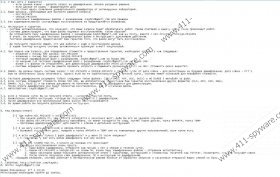Cryptobot Ransomware Removal Guide
Cryptobot Ransomware is a tremendously harmful piece of software which slithers into Windows operating systems using corrupted spam email attachments. In some cases, these corrupted emails could be produced with a little bit of effort. For example, a fictitious survey could be used to collect information about you beforehand. Needless to say, it is much more likely that you would open an email that is addressed to you, and provides some personal information. Nonetheless, you should NEVER open suspicious email attachments sent by unfamiliar senders, especially if automatic malware removal software is not activated. A legitimate security tool would delete the downloaded file or would block access to it, which means that you would not have to delete Cryptobot Ransomware.
Unfortunately, Cryptobot Ransomware removal may be the least of your problems. The clandestine ransomware-type infection is set to block .jpg, .jpeg, .pdf, .doc, and other personal files. After encrypting your files, which is done using the RSA-1024 algorithm, Cryptobot Ransomware auto-runs a file called UNCRYPT.txt. This text file presents a ransom demand, indicating that users must pay a $500 fee within the next 24 hours in order to have the corrupted files decrypted. Users are even provided with contact information, and they can communicate with schemers via email (keybtc@gmail.com) or Twitter (twitter.com/keybtc). We do not recommend getting in contact with schemers at any point. We also do not recommend paying the demanded ransom. It is impossible to know whether your payments will actually help decrypt files, or of it will be taken from you for no good reason.
If you remove Cryptobot Ransomware files (e.g., key.private, unique.private) and delete the registry entries, you will not be able to restore the encrypted files. This is a devious, malicious device that cyber criminals have employed to ensure that all affected users are forced to pay the money. As you may know already, Cryptobot Ransomware is not the only computer infection that might encrypt your files. Other users may worry about the removal of CTB-Locker, CryptoWall, CryptoLocker, Cryptorbit, and other malicious threats. Unfortunately, the removal of these threats is complicated as well.
If your personal files are backed up, it is likely that you will choose not to pay the ransom demanded by the malicious Cryptobot Ransomware. We recommend using automatic malware removal software to delete all malicious files and registry entries related to the ransomware. If you choose to perform the manual Cryptobot Ransomware removal, make sure that you delete all files and remove all registry entries, and then install legitimate security software. This software will guard your operating system against the attacks of other infections. Well, what should you do if the corrupted files are important? As mentioned before, we do not recommend paying the ransom fee and relying on the justice of cyber criminals; however, this is entirely up to you.
Cryptobot Ransomware Screenshots:


